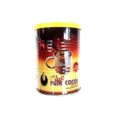It’s been a really long day and you’re staring at the door of your gym, trying to summon the energy to hit the weights or do a cardio session. We’ve all been there. That’s where pre-workouts, short for pre-workout powders, come in – they promise to turn you from exhausted to energized in a single scoop, but are they good for you?
Energy drinks scream at you from store shelves and fitness influencers will talk your ear off about their secret weapon, but we need to separate fact from fiction. We’ll see what’s the science behind pre-workouts and is it really a game-changer or you’re risking more than just a caffeine crash by taking them.
Sit back and let’s see what’s really up with these pre-workouts!
What is a Pre-Workout Powder?
If a workout had an engine, a pre-workout would be its fuel. It’s a mix of powders or liquids made to give your body a boost before you start exercising. They kick your energy levels up a notch and help you power through your workout even if you’re tired and don’t feel like doing it.
Usually, caffeine is the main ingredient, but this is not like your morning coffee. It’s more like coffee on steroids. Apart from caffeine, you’ll find creatine to support the growth and strength of your muscles, and then there are amino acids. They’re building blocks of proteins, and they help your muscles recover and prevent post-workout soreness. You’ll also find additives like sweeteners, flavors, and even colors.
It all sounds great on paper, but all of these ingredients have side-effects. But in all honesty, what doesn’t? It’s true that too much caffeine can lead to jitters or insomnia (even bloating for some), but you need to find the right balance and a product with the right ingredients. It’s all about balance, and once you find it, you should have no problems with pre-workouts.
4 Benefits of Pre-Workout Supplements
So, what’s the deal with a pre-workout? How does it make you feel and why are so many people using it?
There’s a decent amount of benefits, and if you haven’t used one before, this part will make you want to give it a try.
Better Performance and More Energy
This is the main reason people use pre-workouts – to boost their energy and have a better performance. Since caffeine is usually the main ingredient, it will kick your stamina into high gear, and you’ll be able to work out more efficiently.
Improved Concentration and Focus
Working out can be monotonous sometimes so your mind will wander off, but a pre-workout can help with that. Caffeine will make it easier for you to focus on the workout and do it precisely and with purpose.
Stronger Muscles
Your muscles will love pre-workouts because of creatine. It supports the strength and endurance of your muscles, so you’ll be able to push through those last few reps or that final sprint without feeling like you’ve hit a brick wall.
Faster Nutrient Delivery
Some pre-workouts are formulated to improve your blood flow, so your muscles get nutrients faster than they usually would. This means that your post-workout protein shake will be absorbed better, so your muscles will recover and repair faster.
3 Potential Risks and Side-Effects
Right now, it sounds like unicorns made those pre-workouts out of rainbows and happiness because they sound too good to be true. If we’re being totally fair, it’s not all that great and there are a few side-effects you should be aware of.
Side Effects of Caffeine
Overstimulation, insomnia, increased heart rate… Caffeine can do all of this. It packs a punch, that’s for sure, but too much of it can cause problems. Make sure to take pre-workouts in reasonable amounts, no matter how tired you are and how tempted you are to go for a little bit more. Find your sweet spot, otherwise you’re in for a jitterfest.
Gastrointestinal Issues and Dehydration
Some pre-workouts, especially those with certain additives or a lot of caffeine, can upset your stomach. They can also lead to dehydration because caffeine is a diuretic. Drink enough water and change your pre-workout if you notice any discomfort.
Dangers of “Dry Scooping” and Improper Use
Remember that cinnamon challenge, when kids with nothing better to do would take a spoonful of cinnamon? That didn’t seem pleasant, right? If you dry-scoop a pre-workout (meaning, you take it without water), it will lead to a concentrated, rapid intake of ingredients, and that is never good because it can cause distress and choking. Another issue is taking too much of it, meaning, going above what the manufacturer recommends. Always stick to the recommended dose and always mix it with water.
FAQ
Can I use a pre-workout every day?
You really shouldn’t. If you do, you risk becoming dependent on its stimulants, tolerance buildup, and potential side-effects. Use it here and there, when you really need it because that’s what it’s for – to give you a boost when you’re tired. And you can’t be that tired every single time you want to work out.
How long before the workout should I take my pre-workout?
30 minutes to an hour is okay. This allows enough time for the supplements (especially caffeine) to be absorbed. But make sure to check the label on the pre-workout and go by what the label says. A lot of them will tell you exactly when to take it.
Conclusion
When you really think about it, this is about common sense – if you’re a normal person who takes their pre-workout in moderation, when they need it, you’ll be fine and you’ll get all the benefits you’re after. But if you use it all the time and you use more than the manufacturer suggests, well… You’ll have more than just jitters to worry about.
Check the ingredients, see how your body responds to what you’re taking, and change it if you need to. When you decide to use a pre-workout, it should be an informed decision, not something an influencer suggested and now you just need to try it.
Do you use a pre-workout and what’s your favorite one? How often do you take it? Have you noticed any side-effects and how have you handled them?
Leave your comments down below! This is such a broad topic, it would be a shame not to discuss it further!
References:
- Regina Wierzejska “Caffeine – common ingredient in a diet and its influence on human health,” Roczniki Państwowego Zakładu Higieny. 2012;63(2):141-7. [Article in Polish]
- Shih-Hao Wu, Kuan-Lin Chen, Chin Hsu, Hang-Cheng Chen, Jian-Yu Chen, Sheng-Yan Yu, Yi-Jie Shiu “Creatine Supplementation for Muscle Growth: A Scoping Review of Randomized Clinical Trials from 2012 to 2021,” Nutrients. 2022 Mar; 14(6): 1255.






